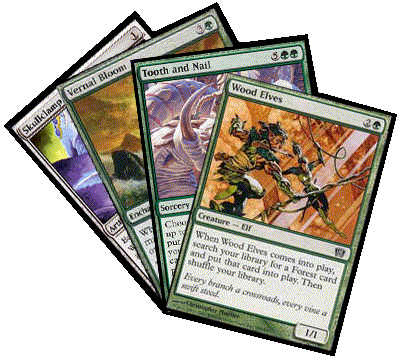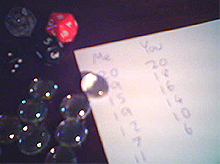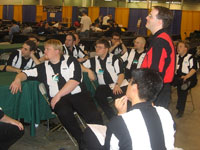
[Editor's note: MTGCast was a late scratch this week, and there wasn't time to post a new article in its place. We're doing this as a Classic because 1) it's good and informative, 2) Gavin is on the MTGCast team, and 3) Gavin is in a unique runoff for the October Article of the Month prize. This article was originally published in May of 2005. Enjoy, and we'll have new articles again starting tomorrow!]
(Author's note: This article was originally written in October of last year, but was never published. Therefore, some of the references made in this article are slightly outdated. Sorry for any problems this may cause.)
Hello,
Before I start getting into the main part of the article let me introduce myself. My name is Gavin Verhey and I've been playing Magic since January 2001. I didn't start playing competitively in tournaments outside of FNM until later that year. In 2003 I went to San Diego for JSS Championships/Nationals. Even though I wasn't qualified for JSS Championships, I still played in the Qualifier, and I didn't make it in. Not qualifying really made me realize how big of a deal Magic was. And it inspired me to become a better player and play seriously. This year I participated in 7 Junior Super Series challenges, and I got to the top 8 of all of them, including both of the ones held at Gen Con SoCal, which really showed how much I improved and how much I learned after really wanting to be able to play competitively. I also became a Level 1 Judge earlier this year.
Discussing strategies with other Magic players is a very important asset, and if you aren't already a member of the MTGsalvation Forum Community, I urge you to join.
But enough about me. My history isn't why you're reading this article, is it? On to what I'm going to talk about today: some things that I think that every Magic player should know, some tips and tricks of Magic. These are little things that I've picked up over the years of playing and even though many of them are minor things, several minor things can help you win the game.
Tip #1: Play good decks
This one seems pretty simple doesn't it? Well, I constantly see good players playing decks that are less then stellar. I learned this rule the hard way when I kept playing dead decks that I loved, just to see them lose over and over again. Playing your fun Blue Wizard deck with your friends is all good, but if you want to win a fair share of games I would advise never playing any deck that is below tier 2 unless you are playing a rogue deck (which wouldn't be classified on a tier because no one else has heard of it). A good rogue deck is always one of the largest threats in a tournament, because no one knows what it does or how to handle it. But, to create a good rogue deck is very hard to do, which brings me to my next point...
Tip #2: Try out rogue decks
One thing that you should do is create rogue decks. Creating a good rogue deck, is hard, but a good rogue deck can easily win tournaments. For example, Sameer Merchant's very successful Elf and Nail deck that no one had heard of (except for the people who tested it) and it won Northwest Regionals. The reason it won is very simple --- no one was prepared for it!

Who knew?
Make sure that you can trust people that you play new decks against, because if that deck proves to be amazing you don't want that guy telling his buddies about it; posting it online somewhere so that your deck becomes common knowledge.
Continuing the Elf and Nail example: if Elf and Nail was known a few weeks before Regionals and people had tested it finding that it was good, it wouldn't be a secret and people would know how to beat it and what it did. Also, always remember that sometimes the craziest ideas for decks turn out to be successful. If some weird idea for a deck pops up in your head, try and write it down somewhere so you remember it, and then when you have time write a decklist and see if it works. Also, never test decks against anything but decks that have proven to be good. If your new original deck can't beat good decks, it isn't going anywhere. Speaking of testing....
Tip #3: Test everything
Testing is key to becoming a better player. Test with your friends, test with family members that know how to play, just about anyone that can play Magic well and that you trust. Although you want to test existing established archetypes, always try something new once in a while. Even if you hear that a card is bad in the deck that you're testing, try it out. Sometimes people will just say that a card is bad in a certain deck without any testing at all, or their testing wasn't good enough to show that the card is actually good. If you live close to some people who play at your local FNM, you might want to consider asking them if they want to create a playtest group, and you could get together a few times a week to test decks and throw around ideas for a few hours. Who knows, maybe your playtest group could become a team and your team could become a large force at tournaments!
Another large part of testing is being able to know your deck. The more your test, the more you learn the ins and outs of your deck. By testing, and knowing your deck, you can figure out such things as just how often you can keep a 2 land hand and be successful with it, when you need to be aggressive or stay on defense, and what ways you have to get out of any given situation. Sometimes subpar decks that a player who has tested a lot beats a better deck, just because the opponent never took the time to know his or her deck inside and out.
Tip #4: Look at what your opponent brings to the game
Look at what your opponent brings to the table. For example, if your opponent brings a bunch of dice/counters in a constructed tournament, it is more than likely that they are playing either a rogue deck or playing Ravager Affinity. If your opponent brings a pad of paper that was used to keep track of life totals, try and get a glance at it. If it looks like that player's opponent's life total went down fast, they are probably playing an aggressive deck. If your opponents life totals kept going up and down, that player probably has Exalted Angel, or Pulse of the Fields in his or her deck. If they wrote the name of some cards on it, they can probably reveal your hand somehow.

Too much information?
Tip #5: Riffle Shuffle
This is a very important thing to do. Sometimes I see people do a pile shuffle, do a few minor things, and then they are done shuffling. This is a bad idea. Always, and I mean always, riffle shuffle a few times. Riffle shuffling can help you win games. Until last year I didn't know how to riffle shuffle at all. No matter how many times I would pile shuffle and do some other shuffling methods, my deck never seemed to be randomized enough. Ever since I have started riffle shuffling I have had much better hands, with fewer land clumps, manascrews, etc.
If you don't know how to riffle shuffle, keep a stack of cards near your computer and whenever a page is loading or you are waiting for a response from an Instant Message, start trying to riffle shuffle a pile of cards. It took me a little over a week, but I finally was able to riffle shuffle. If you've never seen someone riffle shuffle before you probably don't know quite what to do, but I bet you could find somewhere online that teaches you how.
Tip #6: Shuffle away from your opponent
This one is in the same vein as the last tip, but very different. Always try and shuffle so your opponent can't see the cards. Don't shuffle toward you, as the DCI doesn't allow that, but when riffle shuffling or pile shuffling try to move the cards quickly enough that your opponent can't see any of them. Even though it doesn't seem like a big advantage, if your opponent can see something as simple as a Stone Rain or Arcbound Ravager, they know exactly what you're playing.
Also, watch your opponent to see if they reveal any cards while shuffling. For example, if you are playing a control deck and you see a Stone Rain in your opponent's deck, they are probably playing Land Destruction, and you would probably keep a hand with more land and counterspells. Don't go into large measures to see some of your opponents cards. If you do anything slightly suspicious, you could get a warning or worse from a judge.
Tip #7: Watch your opponent
I've seen several players (and at one point I was one of them) who always seem to be looking just at their cards on their side by riffling cards in their hands or just trying to plan out moves. What you should be doing, however, is watching your opponent. Look at their side and see what they're doing. Something you should make sure to do is keep your eyes on your opponent's face. Sometimes players will show different things when they draw certain cards. One player I know has a bad habit of bobbing his head slightly when he draws a good card. Also, by looking at your opponent, your opponent can sometimes feel pressured and make the wrong move, even though you're not really doing anything. Just make sure you don't make any mistakes because you feel rushed, which brings me to my next point....
Tip #8: Always evaluate everything
This is a simple mistake I see commonly made. Sometimes people just don't evaluate everything properly, and you need to make sure that you do. For example, if you're playing a Blue Control Deck, whenever a player plays a spell always look at your hand and make sure that you don't have a counterspell that you want to use. Once I was watching a game and it was Blue Control versus Affinity. In one turn the Affinity player played Arcbound Worker, Frogmite, Frogmite, Myr Enforcer. Everyone watching the game knew that the Myr Enforcer needed to be countered based on what was happening. The Blue player had a counterspell in his hand, but after saying okay to the Arcbound Worker and both of the Frogmites, as an automatic reaction he said okay to the Myr Enforcer too.
The moral of that story is to always look at your hand and make sure you couldn't do something else. Also, never just blindly attack with everything and hope to win. Always try to figure out what will happen when you attack or when you do anything that your opponent could respond to for that matter.

These guys can be your worst enemy
or your best friend.
Don't let them be the former.
or your best friend.
Don't let them be the former.
Tip #9: Call a Judge
This is one of the simplest things, but yet so many times I see a player believe their opponent. If you have a rules argument, always call a Judge. Don't wait for your opponent to give you an answer.
Your opponent may be wrong, and obviously your opponent doesn't want you to win, so he or she may give you a wrong answer. If you feel that a Judge gave the wrong ruling (which does happen) you are allowed to appeal to the Head Judge. Let the original Judge finish making his ruling before you appeal; the Head Judge's ruling is final. Of course, knowing the rules helps so that hopefully things that don't work never come up, and you can catch your opponent if he or she makes a move that can't be done, which brings me to my next, and final, point....
Tip #10: Learn the rules
One thing you can do to recognize bad moves, is to read and learn from the Comprensive Rules. You can find the Comprensive Rules at http://www.wizards.com/default.asp?x=magic/rules/tourneyplayer. At the Champions of Kamigawa Pre-release, a few players tried to use Cage of Hands with Horobi, Death's Wail in play. They tried to play it on a Creature and return it to their hand before the Creature was destroyed; you can't do that. Since the players were informed that they couldn't return the Cage to their hand, they lost the very powerful Enchantment. This is just one of many examples that come up in games where you make a mistake because you thought it worked differently.
Thank you for reading, and I hope that you enjoyed this article. Try using, and practicing, these tips at the next tournament you go to.
Until next time,
Gavin Verhey
Comments